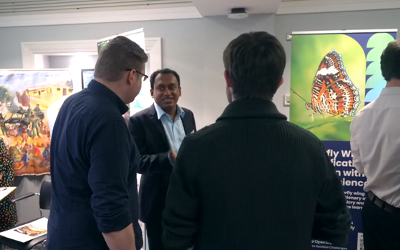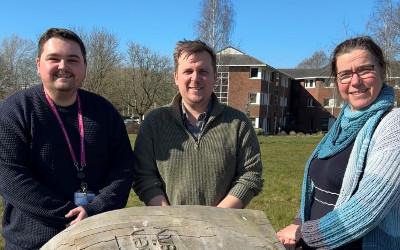Five minute videos: projects essential for a sustainable future

The Open University’s 'Shaping a sustainable future – the power of Open Research' event exhibition featured some of the University’s research projects which focus on multidisciplinary, challenge and mission-focused research.
Held at the Wellcome Collection in London, the exhibition space was alive with interest and excitement for research as saw academics converse with interested delegates on a range of topics such as sustainable processes linked for an integrated circular economy, connecting communities and heritage against climate crisis, Butterfly wing diversification and evolution with citizen science, and catalysing transformative food futures for global sustainability. All of which are essential for a sustainable future.
Professor Nicholas Braithwaite gives an overview of the exhibition and some of the projects this in this short video.
This event, Shaping a Sustainable Future: The Power of Open Research, reflects our recognition that the challenges posed by climate change and net loss of biodiversity call for interdisciplinary, multi-perspective collaborations. Being here, seeing other people and talking to them about their ideas, about their research is a good opportunity to have a more sustainable world. We're responding to the climate and nature crisis through applying our learning to the protection of people's rights, to the robust influencing of policymakers, to the safeguarding of food supply chains, and to improving living conditions now and for future generations worldwide.
It's been very inspiring, very encouraging to meet other partners, other teams doing different things. To see that we have a lot in common together, we can then have more impact when you work more together. It's a great exact way of those to sort of raise awareness, tell the story, be part of what the OU are doing in terms of delivering on sustainability.
We are in the business of creating and sharing knowledge. It's really wonderful to see this enormous range of different research. You look at the different projects, and the first instance, you think, "What?" And then you think, "Yes, of course. That makes sense. That's yet another piece of the puzzle." Getting to meet people actually in person and hear about these projects that I've never heard about, I didn't realise they were happening, and it provides a really valuable way of understanding and being able to hopefully get involved. We've just had a great evening. We've been showcasing some of our work on the theme of environmental sustainability, and we've been talking to a large number of people who've come in from outside, people with a general interest in that. I've been able to meet with other colleagues doing fantastic work on sustainability, and this has created a platform for more collaborations, because we are doing the same or similar materials, and as such, that will bring in more diversity to the different aspects or angles that we are looking at.
Our research, our knowledge exchange, and our teaching are brought to bear on environmental and social justice by creating a shared understanding, identifying opportunities, and bringing people together. It's been fantastic to be at the event, because it's allowing us to bring together some of the resources from our different partners. We hadn't actually been able to see the tapestry being created from young girls and women in the Lake Chad region, for example. Together with the work from our other partners, and we've been able to trial one of the methods that we want to use in our research with the delegates here today, which has been a really nice way to hear about them and what they are feeling about climate change. We've had incredible engagement and really, really rich conversations about the ideas that we're working on and the ways it can solve problems that some of our attendees have challenged us with.
Looking at all the broad area of work that's going on in the OU about sustainability and networking with people who actually go out in the field and study all these different aspects of sustainability was really a learning experience for me. The sustainability event today has been an amazing opportunity for us to be able to show them what we are doing in our laboratories that maybe hasn't yet been shown.
We believe that it is through accessible research-driven learning opportunities that the OU can empower people outside traditional university spheres to be positive forces for tackling the challenges of a changing climate and regenerative practices.
We are looking at how we can make the current food system more sustainable. So looking at diversifying the farming landscapes. As you currently know, the current systems is focused on monoculture. Our project is looking at how we can ensure there's diversity in the species that we are growing, but also in the diversity of our farms. Apart from that, we are also looking at how we can sustainably diversify our diets.
We have over 400,000 species that can be consumed, but we are only using 7,000 species. And out of that, only twelve plant species and five animal species are used in the majority. However, we can use the remainder of this number. And lastly, but not least, is looking at genetic diversity. So do we need to go back to the basics of the wild relatives of our plants and include them in the food systems.
Around the globe, we have so many indigenous plant species; however, there is little knowledge on the nutrition side of these indigenous species. So our plan is to basically go back and analyse the nutritious bit of these indigenous species and how we can ensure that they're included in our diets and to engage with various local communities on how they perceive these indigenous and local species and how best they can be able to prepare them for their diets.
Because currently, there is less that is known on how they can best be prepared to make them delicious diets. This is contributing to a more sustainable world because we are now able to use multiple species for consumption. So instead of relying on one or a few species, we are able to look at other species. For example, in Malawi there is a big El Niño where they have loads of droughts, but some of the indigenous species are resistant to these droughts. And local communities are being encouraged to use those species as a way of nourishment, but also for future use. Some of the recent innovations that are key in sustainability are agro-ecology and agro-forestry where you are having multiple species in a single field.
So growing together plants, trees, and raising of livestock. So if you have this particular system, you are ensuring that there's biodiversity in terms of insects. So you have more pollinators, you have more beneficial insects like predators that feed on other pests. So you're reducing the need for pesticides. And if you have legumes in the system, you are reducing the need for fertilisers.
So this is more sustainable to the environment, but also to the community. We measure the success of the sustainability efforts by looking at the number of people diversifying their diets, reporting the benefits of consuming multiple species, and then looking at the reduction in the need of pesticides and fertilisers. So this is then bringing in more biodiversity. So comparing monoculture systems and more biodiverse systems and looking at the insects, for example, which are in these two systems.
With this particular project, we have been able to make various partnerships with various individuals and different countries. So we have partners in India, in Kenya, in Malawi, in America, where we are working on how we can amplify the usage of indigenous species for sustainable diets. And apart from that, we have been involved in working with transdisciplinary researchers, looking at ecology, anthropology, and social sciences.
And this brings in inclusivity and engaged research, which we believe is something that we need for a sustainable future.
You can find more videos on our research to support shaping a sustainable future in this YouTube playlist.
This research forms part of the University research strategy which has a focus on sustainability as one of three main ‘Open Societal Challanges’ themes.
Quarterly Review of Research
Read our Quarterly Review of Research to learn about our latest quality academic output.

Contact our news team
For all out of hours enquiries, please telephone +44 (0)7901 515891
Contact details